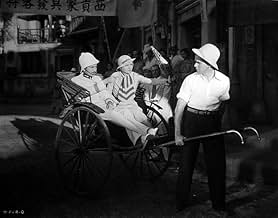Aggiungi una trama nella tua linguaA woman travels to a French penal colony in Indochina to be with her fiancé, the commander, but when she arrives she discovers that he is now an alcoholic.A woman travels to a French penal colony in Indochina to be with her fiancé, the commander, but when she arrives she discovers that he is now an alcoholic.A woman travels to a French penal colony in Indochina to be with her fiancé, the commander, but when she arrives she discovers that he is now an alcoholic.
- Colonel Du Flos
- (as Ian MacLaren)
- Edward - Pianist-Singer at Engagement Party
- (non citato nei titoli originali)
- Engagement Party Guest
- (non citato nei titoli originali)
- Soldier in Indo-China
- (non citato nei titoli originali)
- Man on Ship Deck Next to Verlaine
- (non citato nei titoli originali)
- Felice
- (non citato nei titoli originali)
- Lieutenant at Engagement Party
- (non citato nei titoli originali)
- Party Guest
- (non citato nei titoli originali)
- Extra
- (non citato nei titoli originali)
Trama
Lo sapevi?
- QuizAnn Harding flew herself to the Sarasota, Florida, filming location so that she could log a sufficient number of hours for her pilot's license.
- BlooperWhen Therese arrives in Saigon, she takes a short ride with Captain Bandoin in a rickshaw. At one point, when they move into bright sunlight, a clear shadow of a crew member and the boom microphone falls across the pair--and the crew member seems to attempt to duck down.
- Citazioni
Therese Du Flos Verlaine: [as Therese prepares to leave for French Indochina, she says goodbye to her father, the Colonel] Aren't you going to let me forget just for five minutes that I'm a soldier's daughter?
Col. Du Flos: From now on, you'll have to remember it more than ever. You're going out to marry André, but that is not enough. You'll live in a place where it is impossible to live; you'll make your home where no home can be. Have you sufficient strength for that?
Therese Du Flos Verlaine: I hope so, sir.
Col. Du Flos: I believe you have, but so has the jungle. Don't let it engulf you. Don't let it break André. Take to him your race for a wedding gift, the prestige of the White man. That means everything you stand for, and it is the only weapon you two will have--prestige--but it is enough to preserve you. Now--wasn't that a pretty speech?
Therese Du Flos Verlaine: Yes, sir, it was. And I'll try to remember it, if you'll kiss me.
- ConnessioniFeatured in Of Black America: Black History: Lost, Stolen or Strayed (1968)
- Colonne sonoreLa Marseillaise
(1792) (uncredited)
Written by Claude Joseph Rouget de Lisle
Played in the score when "L'Armee de la Republique" sign is shown
This film has to do with colonialism, and the power or prestige, if you will, of the white man. It was filmed in Florida; somehow Hollywood often made you believe their sets or U.S. locations were Europe or the Tropics or the jungle.
Prestige is not in great shape and some of it was difficult to understand. Melvyn Douglas is a French officer in the army, assigned to oversee a penal colony in Indochina.
Capt. Andre Verlaine (Douglas) is engaged to marry the lovely Therese Du Flos (Ann Harding), but when he finds out where he's going, the marriage is put off. She has another man interested -- Remy (Adolphe Menjou). After a while, though, Therese talks her father (Ian McLaren), a Colonel, into letting her join Andre.
Unfortunately for her, Andre is a bit like Jack Nicholson in The Shining. He gets where he's going and turns into a whack job almost immediately. When Therese arrives, he's passed out on the floor from booze. He's been driven crazy by the heat, the bugs, the humidity, and the isolation.
He and Therese marry and he makes an attempt at straightening himself out, and Therese tries to adapt to the country. Meanwhile, Andre is trying to get a transfer.
When Remy arrives and informs Andre that he has to stay at the post indefinitely, he snaps and becomes jealous of Remy and Therese, believing she wants to be with him.
Tay Garnett, who directed, was trying out some new camera work in this film, doing tracking shots and using a lot of dolly shots. Originally in films, the camera couldn't be moved - I think many directors were experimenting with this new freedom.
I did see some criticism of the acting. Let me say it was very 1930s. Melvin Douglas had many mood changes, and they were very dramatic ones No matter what his instinct told him -- and I feel he was one of the greatest actors ever -- the style in those days was way, way over the top as compared to now.
If he came off as unstable and almost like a multiple personality, it's because, let's face it, the character probably was just that. Not a well man by any stretch. Douglas had so few opportunities to do anything with a range in it until his older years, it was kind of nice to see him do this.
Odd movie, depressing in spots, its point of view strange, but it's a good study of what colonialism was like.
I più visti
Dettagli
- Tempo di esecuzione1 ora 11 minuti
- Colore
- Proporzioni
- 1.20 : 1
Contribuisci a questa pagina

































